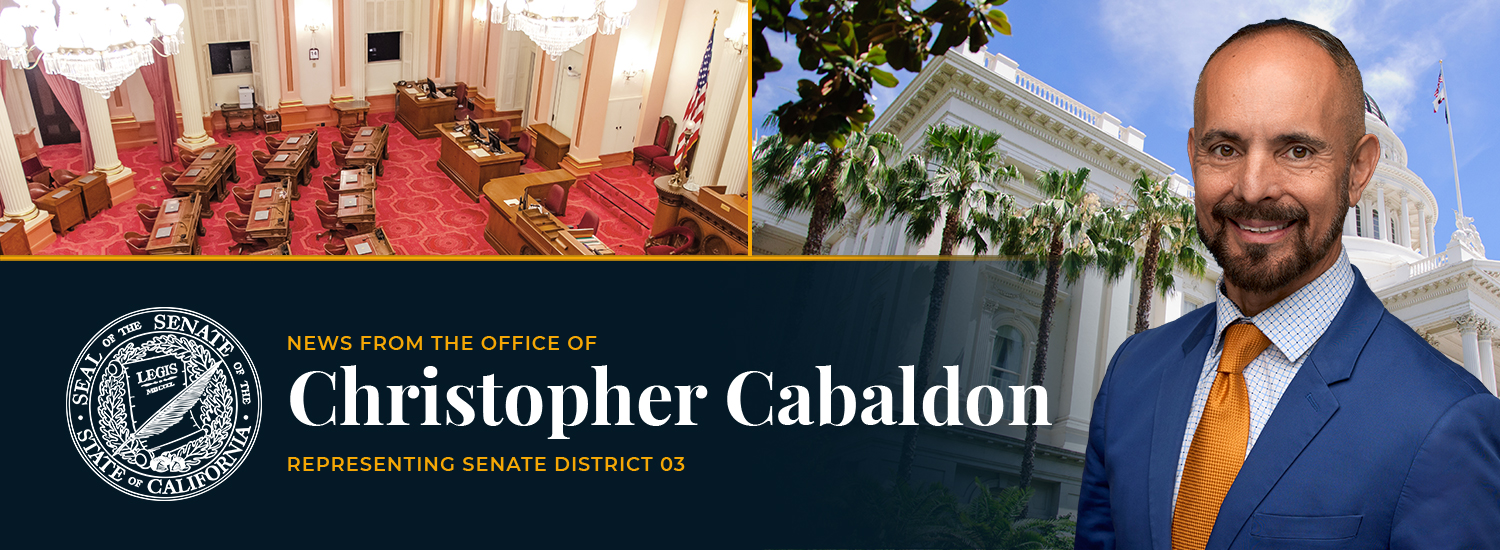
Cabaldon bills improving access to higher education clear key Assembly committees
Cabaldon bills improving access to higher education clear key Assembly committees
SACRAMENTO -- Three bills by Senator Christopher Cabaldon to improve access to higher education in California passed Assembly committees Tuesday on their journey to becoming law. The bills passed Tuesday expand the ability of California universities to offer online courses to students in other states, establish automatic admission to the California State University system, and protect the accreditation of California schools.
Expanding online learning for California students, schools
SB 790, which last month passed the Senate on a bipartisan vote, Tuesday cleared the Assembly Business and Professions Committee. The legislation removes barriers that today restrict California universities from offering courses online and that leave California students with fewer consumer protections when they take an online class from an out-of-state school.
Today, California is the only state that doesn’t belong to the State Authorization Reciprocity Agreement, an interstate pact that allows schools to offer online classes in other states, and that contains protections to prevent students from losing their tuition if a school closes or otherwise fails to deliver on its promises. SB 790 authorizes the governor to join the agreement.
Because they don’t belong to the interstate pact, California schools now have to obtain authorization and pay fees in every state for every class they offer online, hurdles that dissuade many from offering online learning at all.
“Many California institutions are not in the online space,” Sen. Cabaldon said. “We are losing our position as the national leader in educational innovation and access.”
The legislation is supported by the University of California and California State University systems, as well as notable private schools such as Stanford University. Testifying in favor Tuesday was Dr. Maureen O’Connor, president of Palo Alto University, a leading trainer of the state’s mental and behavioral health workforce. The school has about 600 students enrolled in its online classes, all but 90 of them in California.
O’Connor said students suffer because of California’s educational isolation. “One student in our counseling program’s partner was unexpectedly transferred to New York and she could not continue in our program as it’s virtually impossible to become authorized in New York State.”
‘You’re admitted!’ California seniors will receive automatic acceptance letters from CSU
The Assembly Committee on Higher Education Tuesday passed SB 640, Sen. Cabaldon’s bill to offer automatic CSU admission to every qualifying high school senior in the state. The bill earlier won unanimous approval in the Senate.
Students who meet the requirements for California State University would no longer need to apply. They instead would receive a congratulatory letter in the mail from CSU informing them they are admitted to a list of campuses with enrollment capacity.
Education experts say receiving an acceptance letter is a powerful psychological prompt for a student to consider a four-year college, even if they didn’t think it was possible. Sen. Cabaldon pioneered the practice of automatic admission as mayor of West Sacramento with the city’s Home Run program, the first city-run initiative in the country to automatically admit students to community college and waive their tuition.
“SB 640 is motivated by the idea that it should be as easy and seamless to go from 12th grade to the next step as it is to go from 10th grade to 11th grade,” Cabaldon said.
The legislation builds on a CSU pilot program that this year sent all qualified high school seniors in Riverside County an offer of admission to 10 campuses, most of which are under-enrolled. Of the 17,000 students who received offers of admission for the fall 2025 semester, 13,200 completed the required paperwork – an increase of 3,000 over the previous year.
By encouraging more students to enroll in a CSU, Sen. Cabaldon not only seeks to provide more opportunity for Californians, but also to reverse enrollment declines that have affected many campuses. Two of the campuses that have seen the greatest enrollment declines are located in Sen. Cabaldon’s district: the CSU Maritime Academy in Vallejo – which recently combined operations with Cal Poly San Luis Obispo -- and Sonoma State, which is retooling itself in the face of a large budget deficit.
In addition to the automatic admission, SB 640 seeks to ease the ability of students to transfer from community colleges to CSUs by requiring that a task force be convened to create five new pathways of study that would begin at community college and be completed at a CSU. The bill specifies that these should be in fields that offer students the best opportunity for economic and social advancement.
Protecting the accreditation of California schools
Guarding against potential attacks on accrediting agencies by the Trump Administration, Sen. Cabaldon introduced SB 744, which aims to protect the accreditation of California’s higher education institutions. The bill was amended in June and passed its first legislative test Tuesday in the Assembly Higher Education Committee.
This bill says that any national or regional accrediting agency recognized by the United States Department of Education as of January 1, 2025 will retain that recognition until January 20, 2029, provided that it continues to operate in substantially the same manner as it did on January 1, 2025. The bill would repeal those provisions on January 1, 2030.
“Whatever is happening at the federal level we need to have some safe harbor,” Sen. Cabaldon said.
#######